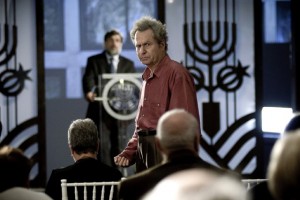
I’ve given Joseph Cedar’s Oscar-nominated (Best Foreign Langage Film) Footnote the “Top Pick” of this week’s movies, but I want to be very clear on what that means. I think it is the most completely assured of the three films under consideration for that position, but I do not otherwise feel it is better than the other two—Being Flynn and The Kid with a Bike—and I frankly recommend all three movies. We should have such quandaries every week, though it has the unfortunate downside that one or more of the films is likely to end up getting overlooked. (It’ll be an easier call for the subtitle-phobic, since only Being Flynn is in English.)

Since Footnote deals with rival father-and-son Talmudic scholars, it may be assumed to be a film that requires a certain specialized knowledge to fully “get.” I didn’t find that to be true, since I know very little about the Talmud. I do, however, suspect that the film plays better if you have some working knowledge of academia or the world of “scholarly” publishing. It matters little whether we’re talking religious studies, literary ones, musical ones or, yes, motion pictures. The various worlds are very similar—enclosed, competitive, obsessed with minutiae, rife with backbiting, jealousy and its own particular kind of double-dealing. That the film at hand deals with the rarefied field of Talmudic scholarship makes little difference.

Footnote is essentially a comedy—or a tragedy, perhaps—of errors. Its premise is simple enough. Hotshot Talmudic scholar Uriel Shkolnik (Lior Ashkenazi) is a popularizer. He reduces things to easily understood and digested ideas—and, as a result, his work is well known and highly regarded. His father, Eliezer Shkolnik (Shlomo Bar-Aba), is his polar opposite—a researcher of the old school who is contemptuous of everything his son represents and jealous of his popularity. It doesn’t help that Eliezer spent the better part of his life on a project that was rendered almost valueless by a jealous colleague, Grossman (Michah Lewensohn), who uncovered a rare volume and published its contents just before Eliezer’s came out. As things have worked out, Eliezer’s major claim to fame—apart from the unbearable status of being Uriel’s father—lies in being mentioned in a footnote by a revered scholar.

The film’s plot hinges on Eliezer accidentally being notified that he has won—after years of being passed over—the ultimate academic honor of the Israel Prize. The truth, not surprisingly, is that it is Uriel who was supposed to have received this call. This throws the inner world of Talmudic academia into a frenzy. The jury wants the mistake rectified, but Uriel is adamant that such a thing will literally kill his father, who has so long waited for this accolade. The committee—especially Grossman—is not in favor of this, but its members realize the complications and the truth of what Uriel says. Can something be worked out? Well, maybe. Grossman holds the key to that—and he wants a heavy price to relinquish the prize to the older Shkolnik. This, however, is only a part of what the movie is about, and signals more where the story will go than anything else.

Much of what happens is bitterly funny—and generally more bitter than funny. What makes it work—apart from the performances—is the assured handling of it all by writer-director Cedar. Cedar is invariably inventive, but just as invariably on the mark in conveying the undercurrents of the story. It is this that raises what would otherwise be a pretty unpleasant story about generally unpleasant people into something that is compellingly watchable. Definitely a film worth seeing, but it is indeed bitter. Rated PG for thematic elements, brief nudity, language and smoking.




I assume that Eliezer isn’t in fact a mute, despite the trailer’s inability to confirm this?
I would not call him exactly chatty, but, no, he is not a mute.